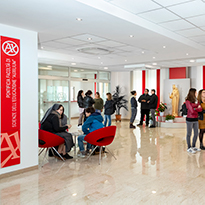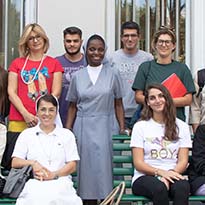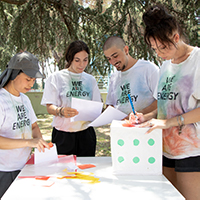Planning and Coordination of Socio-Educational Services
PresentationBack to top
The Master's Degree or Licentiate course in Planning and Coordination of Socio-Educational Services trains professionals capable of planning, managing, evaluating and coordinating educational activities with a holistic vision of the individual and of education within the vast and complex range of social and educational services for children, adolescents, families, for people with disabilities, for the disadvantaged and those who are marginalised.
Learning outcomesBack to top
At the end of the course, graduates must demonstrate:
- to have acquired an in-depth knowledge and understanding of specialised and scientific methodologies and content in the field of educational science and social and educational work with children, adolescents, families, persons with disabilities, the disadvantaged and those who are marginalised;
- to be able to plan, carry out and present research into socio-cultural and socio-educational topics;
- to be able to plan, coordinate and implement educational activities in the local area and within the social and educational services in different areas (social work, families, intercultural settings, and with disadvantaged or marginalised minors);
- to be able to promote training courses in the field of preventing hardship and defending human rights;
- to have developed skills for the organisation, management and coordination of social and educational services (nursery, residential and semi-residential homes, day care centres and youth training centres);
- to be able to plan networking activities, especially in the relationship between families, schools and extra-curricular activities and in coordination with the services available in the local area;
- to have acquired the skills necessary for independent and critical continuous learning;
- to have a good command of IT tools for research, communication and information management;
- to know and use a foreign language correctly.
Career opportunitiesBack to top
At the end of the course of study graduates can find work as:
- supervisors, managers and educational coordinators for social and educational services (centres and services for minors, traditional and small-scale nurseries, recreational and leisure activities, home and family services, intercultural work, and activities involving social hardship);
- experts in educational planning, management of educational and cultural services, coordination between public and private social services; evaluation of social and educational services, and the training of youth workers;
- educational consultants and planners in organisations and personal services provided by public and private entities.
Teaching and learningBack to top
The Master’s Degree course covers two years, during which 120 ECTS credits must be obtained. To obtain the necessary credits to graduate students must carry out the required training activities (courses, seminars and workshops) and an internship, as stated in the study programme.
Programs of previous years
Degree recognitionBack to top
The Licentiate and PhDs of the Pontifical Faculty of Educational Sciences «Auxilium» are of pontifical right.
For civil purposes, the degrees are valid in accordance with the laws in force in the various countries and the particular rules of each University.
Admission requirementsBack to top
They can enroll in the Master's Degree (or Licentiate) Course those who have obtained the Bachelor's Degree (or Baccalaureate) in Social Education, or a Degree recognized as equivalent with accreditations properly assessed.
RegistrationBack to top
CoordinationBack to top
CHANG Hiang-Chu Ausilia
CHINELLO Maria Antonia
LANFRANCHI Rachele
OTTONE Enrica
SÉÏDE Martha
SMERILLI Alessandra
SPÓLNIK Maria






